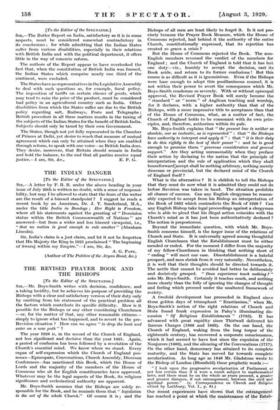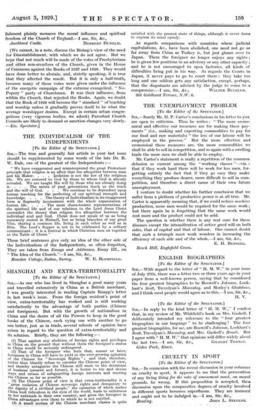THE REVISED PRAYER BOOK AND THE BISHOPS
[To the Editor of the SPECTATOR.]
Sm.,—Mr. Boys-Smith writes with decision, confidence, and a taking lucidity, but he achieves his purpose of providing the Bishops with a clear and satisfactory version of their duty only by omitting from his statement of the practical problem all the factors which contribute its specific difficulty. How is it possible for the Bishops or any other considering Churchmen —or, for the matter of that, any other reasonable citizens— simply to ignore what has happened, and to revert to the pre- Revision situation ? How can we agree " to drop the book and enter on a new path " The year 1928 is, in the record of the Church of England, not less significant and decisive than the year 1661. Again, a period of confusion has been followed by a revelation of the Church's essential mind. We know where we stand. Every organ of self-expression which the Church of England pos- sesses—Episcopate, Convocations, Church Assembly, Diocesan Conferences—has sanctioned this Book, which the House of Lords and the majority of the members of the House of Commons who sit for English constituencies have approved. Whatever may be the legal aspects of the Book, its religious significance and ecclesiastical authority are apparent.
Mr. Boys-Smith assumes that the Bishops are solely re- sponsible for the Book, and he reminds them that " legislation is the act of the whole Church." Of- course it is ; and the
Bishops of all men are least likely to forget it. Is it not pre- cisely because the Prayer Book Measure, which the House of Commons rejected, had behind it the authority of the entire Church, constitutionally expressed, that its rejection has created so grave a crisis ?
But the House of Commons rejected the Book. The non-
English members reversed the verdict of the members for England ; and the Church of England is told that it has but one duty--viz., humbly to accept the decision, cast its Book aside, and return to its former confusions But thiS course is as difficult as it is ignominious. EVen if the Bishops were base enough to adopt this pusillanimous counsel, it is not within their power to avert the consequence which Mr. Boys-Smith condemns so severely. With or without episcopal approval, the Revised Prayer Book will surely become the " standard " or " norm " of Anglican teaching and worship?
for it declares, with a higher authority than that of the Bishops, with a more impressive title to acceptance than that of the House of Commons, what, as a matter of fact, the Church of England holds to be consonant with its own prin- ciples, and, therefore, authorizes within its pale.
Mr. Boys-Smith explains that " the present law is neither so obsolete, nor so inelastic, as is represented " : that " the Bishops have authority to interpret and apply it " : that " it is their duty to do this rightly to the best of their power " : and he is good enough to promise them " generous consideration and general support." Are they acting unreasonably when they preface their action by declaring to the nation that the principle of interpretation and the rule of application which they shall henceforward:accept shall be nothing arbitrary, nothing merely diocesan or provincial, but the declared mind of the Church of England itself ?
What is the alternative ? It is childish to tell the Bishops that they must do now what it is admitted they could not do before Revision was taken in hand. The situation -prohibits all chance of success. Can any English clergyman be reason- ably expected to accept from his Bishop an interpretation of the Book of 1662 which contradicts the' Book of 1928 ? Can any English Bishop take legal proceedings against a clergyman who is able to plead that his illegal action coincides with the Church's mind as it has just been authoritatively declared ? The notion is preposterous.
Beyond the immediate question, with which Mr. Boys- Smith concerns himself, is the larger issue of the relations of Church and State. It is universally agreed among thoughtful English Churchmen that the Establishment must be either mended or ended. For the moment I differ from the majority of my fellow-Churchmen in thinking that nothing short of " ending " will meet our case. Disestablishment is a hateful prospect, and men shrink from it very naturally. Nevertheless, it is well that their thoughts should be directed towards it. The nettle that cannot be avoided had better be deliberately and decisively grasped. " Does experience teach nothing ? " asks Mr. Boys-Smith. Certainly it teaches much, and nothing more clearly than the folly of ignoring the changes of thought and feeling which proceed under the unaltered framework of society.
A twofold development has proceeded in England since those golden days of triumphant " Erastianism," when Mr.
Boys-Smith's notion of the right relations of Church and State found frank expression in Paley's illuminating dis- cussion " Of Religious Establishments " (1785). It has advanced with great rapidity since Thirlwall delivered his famous Charges (1866 and 1869). On the one hand, the Church of England, waking from the long torpor of the eighteenth century, has recovered a corporate consciousness, which it had seemed to have lost since the expulsion of the Nonjurors (1689), and the silencing of the Convocations (1717). On the other hand, democracy has attained to its complete maturity, and the State has moved far towards complete secularization. As long ago as 1848 Mr. Gladstone wrote to the Bishop of London (Blomfield) these prophetic words :—
" I look upon the progressive secularization of Parliament as not less certain than if it were a result subject to mathematical laws, and there must be on the whole as -years proceed, a greater and greater distance, if not estrangement, between the civil and spiritual- power." (v. Correspondence on Church and Religion edited by Lathbury, Vol. I., p. 81.) Our recent experiences' have shown that the estrangenieni has reached a point at which the maintenance of the Estab-
lishment plainly menaces the moral influence and spiritual freedom of the Church of England.—I am, Sir, &c.,
[We cannot, in a note, discuss the Bishop's view of the need for Disestablishment, with which we do not agree. But we hope that not much will be made of the votes of Piesbyterians and other non-members of the Church, given in the IlOuse of Commons against the Boot& of 1927 and 1928. They would have done better to abstain, and, strictly speaking, it is true that they affected the result. But it is only a half-truth; because many of those votes were given under the influence of the energetic campaign of the extreme evangelical, " No- Popery " party of Churchmen. It was their influence, from within the Church, that rejected the Books. Again, we doubt that the Book of 1928 will become the " standard " of teaching and worship unless it gradually proves itself to be what the average worshipper desires. Except in certain urban congre- gations (very vigorous bodies, we admit) Parochial Church Councils are likely to demand or sanction changes very slowly. —ED. Spectator.]



































 Previous page
Previous page